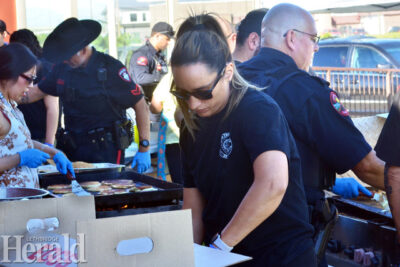Blood Tribe Police Service hosts recruitment pancake breakfast
By Ry Clarke - Lethbridge Herald Local Journalism Initiative Reporter on July 16, 2022.
 Herald photo by Ry Clarke
Blood Tribe Police Services held a pancake breakfast Friday morning in Standoff, aiming to improve recruitment across all levels of law enforcement in Canada.
Herald photo by Ry Clarke
Blood Tribe Police Services held a pancake breakfast Friday morning in Standoff, aiming to improve recruitment across all levels of law enforcement in Canada.Blood Tribe Police Service held a pancake breakfast for the community Friday morning aiming to improve recruitment within the community and helping close barriers hindering Indigenous members from careers in Canadian Law Enforcement.
Hosted in Standoff, recruiters from multiple branches of law enforcement in Canada were present including the Lethbridge Police Service and the Royal Canadian Mounted Police, hoping to encourage Kainai Nation members to pursue different career opportunities.
Brice Iron Shirt, Chief of the Blood Tribe Police Service, said “It’s a great opportunity for us to increase not only our applicants, but every other police service.”
BTPS has been working with the community to expand its recruitment, in partnership with Red Crow Community College (RCCC), helping Indigenous applicants through the process of becoming an officer.
Hadija Little Wolf, administrative sergeant, is the creator behind the program, hoping to close barriers and get more applicants through the recruitment process.
“The goal would be to bring Indigenous people in to do the program. They would essentially be ready to be handpicked by Calgary Police Service, Lethbridge Police Service, Canadian military, and the RCMP. To come in and just handpick them because they will be ready to just be hired.”
Little Wolf says BTPS has a low success rate for recruitment. in 2021, of the 15 applicants only four were successfully hired, with similar numbers in previous years.
Iron Shirt says the hardest part of the recruitment process for Indigenous People is the difference in culture.
“Our thought process is a lot different than the Western way of thinking, very linear and straightforward. We think in abstract, and that’s where things start becoming difficult for us. That’s why the numbers are so low, it’s because our mind processes are so much different than the actual people that wrote the tests, that’s why there’s a high failure rate.”
Iron Shirt says changes need to be made to specific cultures, like Indigenous policing, creating a test that is different from the cookie-cutter style of having the same background and knowledge. Adding that the hardest part of policing is entering an area where the culture is drastically different from an officer’s way of thinking and trying to control a situation without the knowledge of the land and the people.
“We’re a multicultural group that needs to be more accepting of everything, and not just make it one way.”
Programs like the one at Red Crow Community College are the first steps to breaking down barriers and getting more willing applicants into the field. The Alberta Government’s new Community Policing Grant, announced back in June, is also helping recruitment with $150,000 going towards Indigenous Policing. Creating a three-phase process that will go towards RCCC’s policing recruitment initiative, the results should help add five police officers to the BTPS within three years.
With more opportunities arising, the recruitment for future Indigenous people in police services is promising.
“I feel like now’s the time, because a lot of hidden history is becoming so loud that we can’t ignore it anymore,” said Little Wolf. “Now is our time to really start creating our own way of doing things, our own way of learning, and of teaching. Creating programs is really important, so that we are involved at every level of the justice system, or even every level of life. That’s where the diversity comes in.”
15-14


